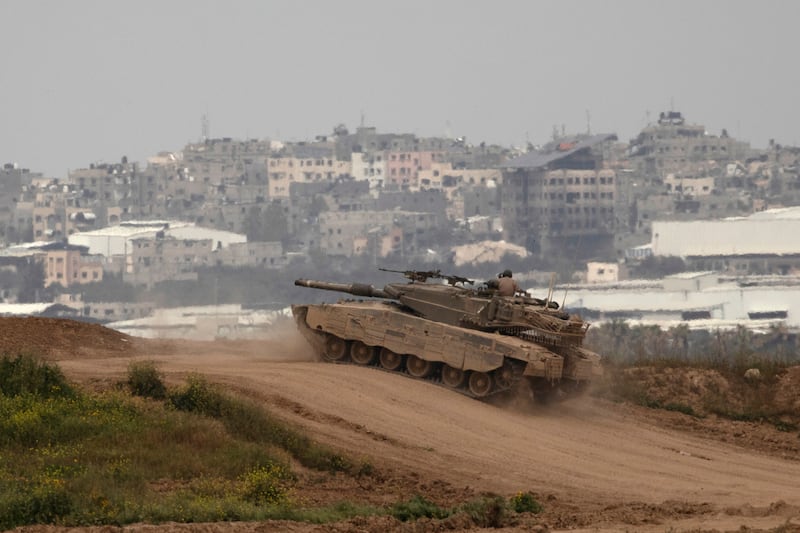Live updates: Follow the latest news on Israel-Gaza
Jordan's King Abdullah II and German Chancellor Olaf Scholz called on Sunday for an immediate ceasefire in Gaza amid growing concern about civilians trapped in Rafah as Israel prepares for a ground assault on the city.
The leaders met in the Red Sea port city of Aqaba, a day after Germany joined an international air fleet that has been dropping emergency supplies into Gaza from Jordan for the last several weeks.
Mr Scholz told reporters that the international focus is “about ensuring we come to a long-lasting ceasefire” that could avert an Israeli assault on Rafah, a refuge for more than one million Palestinians displaced by Israel's five-month-old military offensive in Gaza.
"Israel has every right to protect itself. At the same time, it cannot be that those in Gaza who fled to Rafah are directly threatened by whatever military actions and operations are undertaken there," Mr Scholz said.
Israel says an assault on Rafah is necessary to defeat Hamas, which started the war on October 7 with an attack on southern Israel in which 1,200 people, mostly civilians, where killed.
It was the largest number of Israeli deaths since the 1973 Arab-Israeli war, and the worst attack on Jews since six million perished in the Holocaust, an event crucial to the close ties between Germany and Israel.
Israeli Prime Minister Benjamin Netanyahu has repeatedly pushed back against calls from Israel's allies not to attack Rafah. The US and other countries have warned that this would worsen the humanitarian crisis created by the war and claim more civilian lives in Gaza.
"We will operate in Rafah. This will take several weeks, and it will happen," Mr Netanyahu said before a cabinet meeting on Sunday.
The Palestinian Foreign Ministry said on Sunday that Mr Netanyahu's continuous threats to invade Rafah posed a "blatant challenge to the international and American consensus on protecting civilians".
"Blind revenge dominates the Israeli government and threatens the security and stability of the region and the world," the ministry said on X.
European Commission President Ursula von der Leyen said the European Union was "very concerned about the risks a full-scale offensive in Rafah would have on the vulnerable civilian population", during a speech in Cairo after the signing of an EU-Egypt co-operation agreement.
"This needs to be avoided at all costs,” she said.
A Western diplomat who met Israeli officials last week said a ground assault was the only way to close a border gap through which Hamas could smuggle more weapons from Egypt, on top of the arsenal the group had already smuggled into the enclave.
"The Israelis want to reach the border there. They regard Rafah as crucial for sealing off Gaza and lessening the possibility of an October 7 repeat," he said.
Mr Netanyahu said on Friday that he had approved a military plan to attack Rafah that involved the evacuation of civilians from the city, but Israel's allies remain sceptical.
US National Security Council spokesman John Kirby said on Sunday that Washington was still waiting to see details of the plan.
"They talked about humanitarian islands in Gaza. Again, we welcome the opportunity to see that, to see if that’s actually executable and doable," he said in an interview.
More than 31,600 Palestinians have been killed in Israeli military operations since October and 73,676 have been injured, according to an updated toll released by Gaza's health ministry on Sunday.
The Middle East, and the wider Muslim world, is an important market for German exports. But there has been a broad boycott of Western goods in Jordan and other countries in the Middle East since the war began.
The Royal Palace said King Abdullah discussed the “dangerous developments” in Gaza with Mr Scholz, and affirmed the need for international powers to “move immediately” to push for a ceasefire.
He told Mr Scholz that civilian protection efforts “must be intensified” and that aid has to reach the enclave in “every possible way”.
Mr Scholz has been urging Israel to improve humanitarian access to Gaza. He left Jordan on Sunday for Israel, where he met Mr Netanyahu.
While visiting Berlin last week, the Malaysian Prime Minister Anwar Ibrahim said Europe has been “hypocritical” in its empathy with Israel after October 7, while not showing the same degree of sympathy for the suffering of other peoples.
Jordan, which has a 1994 peace treaty with Israel, has carved a role as a base for parachuting aid into Gaza, although the aid drops are widely seen as doing little to solve deep shortages in basic supplies in the enclave.
At least one German aircraft participated in two aid air drops into Gaza in the last 24 hours, the Jordanian military said, along with Jordanian and US aircraft.
The shortage of aid is largely a result of Israeli inspection procedures at the main aid corridor of Rafah, between Egypt and Israel, the same area that has become a centre for displaced Gazans.
But 200 tonnes of food arrived in Gaza by sea on Friday, the first shipment in a new aid route to the Gaza Strip, which has been devastated by five months of war.
The exact timing of the departure of a second supply ship bound for Gaza remains unknown with poor weather approaching in Cyprus, a charity involved in the maritime aid flow said on Saturday.







